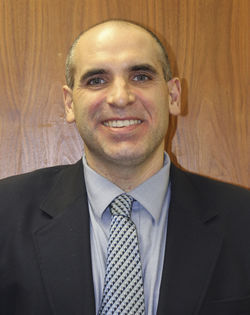Amid at-home quarantines, renewed interest in language learning
Published 8:00 am Wednesday, October 7, 2020

- Alex Poole, interim head of WKU's Modern Languages Department.
Last spring, when the coronavirus pandemic prompted governors across the country to issue stay-at-home orders, leaving millions in quarantine and searching for productive ways to spend their time, language learning apps like Duolingo reported all-time highs in use.
In July, the company told Business Insider that it had seen new users sign up in the “millions,” with growth in the U.S. reaching nearly 150 percent.
That’s no surprise to Alex Poole, the interim head of Western Kentucky University’s Modern Languages Department who studies and teaches language acquisition.
Poole said he’s received several requests for advice about how people can best use their free time to sharpen their Spanish or finesse their French.
It’s a question Poole sets out to answer in his new book, “Learning a Foreign Language: Understanding the Fundamentals of Linguistics,” which is available for purchase on Amazon.
“I’ve always had a passion for language learning,” Poole said. “A lot of people do not understand the process and they want to know how to do it themselves.”
In the U.S., there aren’t many opportunities for native English speakers to become bilingual organically. Language education pathways in schools tend to be limited and underdeveloped, he said.
That’s why Poole recommends students immerse themselves in the language they’re learning, whether by watching a sporting match in Spanish or honing their skills with others via Zoom video calls, along with other tactics he explores in his book.
“I wanted to tell them how to do this, but my other goal was to make it accessible,” Poole said of his book. “A lot of books have one of two problems. One is that they are way too complicated and way too theoretical. … Another problem is a lot of books about learning a language are written by people who make somewhat extreme claims,” offering dubious methods to master several languages in mere months, Poole said.
Language learners should instead stay grounded in science-backed principles for acquiring fluency, Poole said.
Poole said “comprehension is really the king” of all language acquisition.
“Sometimes people start by practicing how to speak, but really the best thing you can do is first to understand what is being said,” Poole said. “You can do that through reading. You can do that through listening to programs or watching programs that you’re already familiar with.”
For English-speaking soccer fans, for example, watching a match in Spanish or French can be a great way to learn quickly, Poole said.
“A lot of terms will just sort of pop out at you,” Poole said. “Comprehension is really key.”
Poole also stresses setting realistic, achievable goals.
“What is it that I want to do with this? What stage do I want to arrive at? What skills do I want to develop, and in what period of time?” Poole said. “Sometimes people have very unrealistic goals. They will say ‘Well, I want to speak like a native speaker within a year.’ And that’s not going to happen.”
Along the way, Poole said language learners shouldn’t be afraid of errors in their speech.
“Let mistakes and errors happen. Don’t try to avoid them constantly,” he said. “You won’t sound like the person in the target language. Your goal is to be understood. … If you want to learn another language, it’s not something that can be done in six months to a year. It’s a constant effort, but the rewards are marvelous.”
– Follow education reporter Aaron Mudd on Twitter @BGDN_edbeat or visit bgdailynews.com.





